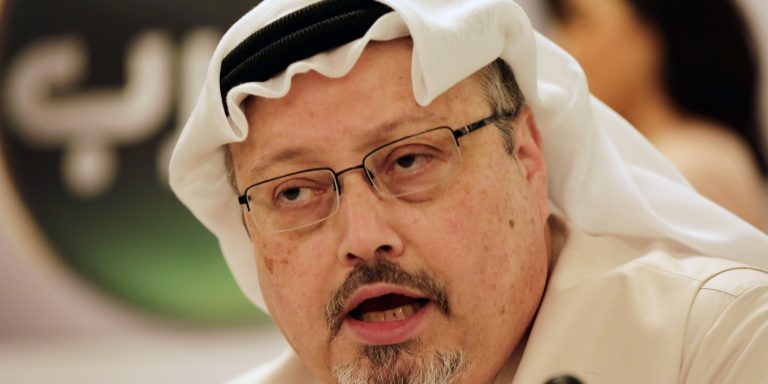INTELBRIEF
October 9, 2018
IntelBrief: Changing the Message by Killing the Messenger

- The whereabouts and fate of Washington Post columnist Jamal Khashoggi remain unclear, with growing concern that he has been murdered by an individual or individuals connected to the Saudi government.
- A long-time critic who warned of the Kingdom’s oppression of journalists, Khashoggi disappeared from the Saudi consulate in Istanbul last week under mysterious circumstances.
- In an unrelated incident, journalist Viktoria Marinova was found raped and murdered in the city of Ruse, in northern Bulgaria; she had been investigating and reporting on issues of corruption in her country for more than a year.
- From cries of ‘fake news’ to suppression and even murder, the targeting and intimidation of journalists is now all too common.
.
On October 02, frequent Saudi critic and current columnist for the Washington Post, Jamal Khashoggi, walked into the Saudi consulate in Istanbul, Turkey. By most accounts, he never walked out and is still considered missing. Turkish officials have stated they believe Khashoggi was murdered inside the consulate, although so far no hard evidence has been offered, at least publicly, and there are mixed signals coming from various Turkish media outlets. Khashoggi has been a long-time critic of the Saudi ruling family, particularly Crown Prince Mohammad bin Salman, who has worked hard to cultivate an image as a reformer, while simultaneously squelching even the smallest level of dissent. To date, Riyadh has denied involvement in Khashoggi’s disappearance, claiming he was in the consulate for only a few minutes before leaving, despite protestations from his fiancé who says he never came back out. If the worst-case scenario is realized, Saudi Arabia will have links to the murder of a vocal critic in a fashion engineered to create just enough doubt for the veneer of implausible-but-sufficient deniability. It also sends and unequivocal signal to other journalists who dare to criticize the regime.
In a separate case of violence against reporters, Bulgarian journalist Viktoria Marinova was found brutally murdered in the town of Ruse on October 06, becoming the third journalist in Europe to be murdered in 2018. It is uncertain if her murder was related to her work, but she had been covering issues of corruption in the EU and her own media outlet, TVN Television. The Committee to Protect Journalists, which tracks threats against journalists, called for a rigorous investigation by Bulgarian officials into ‘the barbaric murder of journalist Victoria Marinova.’ The impact of such a high-profile murder will likely be a short-lived outcry, followed by a resumption of the dangerous trend of labeling journalists as enemies, which leads many to be treated as such.
From the dismissal of uncomfortable messages as biased and without value, it is an easy leap to ‘demeaning the messenger.’ The term ‘enemies of the people’ is an odious term, harkening back to the worst outrages committed by Stalin. By demeaning the messenger as simply biased—or worse, traitorous—governments and organizations seek to convince citizens to ignore unflattering messages and cast opprobrium toward any adversarial voices. Yet it goes even further— a relentless attack on individual journalists or newspapers creates a suspicion of any reporting that falls short of being laudatory. Once this mindset takes root in a sizable portion of a population, it’s nearly impossible to reverse, since any ‘facts’ to prove otherwise are, of course, ‘fake.’
The inevitable next step in this downward trajectory is the intimidation and elimination of journalists— the destruction of the messenger, a tactic regularly used by authoritarian regimes, criminal cabals and terrorist groups in their efforts to silence the opposition. Exposing the truths of unscrupulous politicians or venal corporations has always been a risky, yet vital profession. In recent years, it has become more so, both in its danger and necessity. This week alone has seen two instances of journalists either disappeared or murdered, with concern that these messengers were killed simply for their message. Far too many governments have adopted a ‘3D’ approach to the press: ‘dismiss, demean, and destroy.’ Examples abound and are centered around the concept of disinformation. This dismissal of any press short of sycophantic being dubbed ‘fake news’ is now common, or once again resurgent, in many parts of the world. In both the near and long-term, this phenomenon poses an insidious threat to free speech, free expression and the search for justice and truth in the face of power and corruption.
.
For tailored research and analysis, please contact: info@thesoufancenter.org
[video width="960" height="540" mp4="https://thesoufancenter.org/wp-content/uploads/2018/10/IB-1009.mp4" poster="https://thesoufancenter.org/wp-content/uploads/2018/10/AP_18276106163271.jpg"][/video]